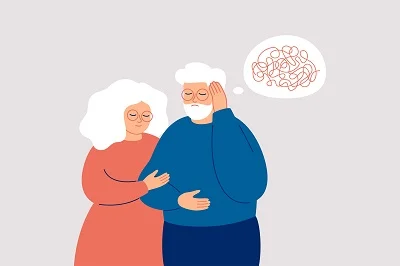Depression is a silent epidemic that impacts millions of people every year. While it can affect anyone at any age, it often affects the elderly population more than any other group. In this blog post, we will discuss the signs and symptoms of depression in the elderly, as well as some of the best ways to treat it. If you are concerned that your loved one may be suffering from depression, please don’t hesitate to reach out for help.
Contents
Defining Depression In Elderly
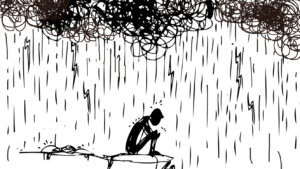 Depression is a largely misunderstood yet very real and serious medical condition that affects millions of people, both young and old. It is a complex mood disorder that is characterized by persistent feelings of sadness, loneliness, worthlessness, and hopelessness. While some people may think that it is a synonym for sadness, it is actually much more complex than that. Depression can impact every area of a person’s life, from their relationships to their work performance, and can even lead to thoughts of suicide.
Depression is a largely misunderstood yet very real and serious medical condition that affects millions of people, both young and old. It is a complex mood disorder that is characterized by persistent feelings of sadness, loneliness, worthlessness, and hopelessness. While some people may think that it is a synonym for sadness, it is actually much more complex than that. Depression can impact every area of a person’s life, from their relationships to their work performance, and can even lead to thoughts of suicide.
There are many different types of depression, and it can be caused by a variety of factors. For the elderly population, some of the most common types of depression include major depressive disorder, dysthymia, and seasonal affective disorder (SAD). Major depressive disorder is the most severe form of depression, and it can cause a person to have difficulty functioning in their everyday life. Dysthymia is a less severe form of depression that often lasts for years, and SAD is a type of depression that is brought on by the change in seasons.
It is important to note that depression is not a normal part of aging. While it is true that the elderly population is more at risk for developing depression, there are many ways to prevent and treat it. If you think that your loved one may be suffering from depression, please don’t hesitate to reach out for help.
Signs And Symptoms
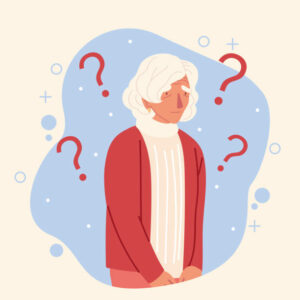
The symptoms of depression can vary depending on the type of depression a person is experiencing. However, there are some common signs and symptoms that are often seen in older adults who are struggling with this mood disorder. Some of the most common symptoms of depression in the elderly include:
- Persistent feelings of sadness, loneliness, or worthlessness
- Loss of interest in activities that were once enjoyed
- Withdrawal from family and friends
- Changes in appetite or weight
- Sleep problems (either sleeping too much or not being able to sleep)
- Fatigue or decreased energy
- Difficulty concentrating
- Irritability or restlessness
- Physical aches and pains
- Suicidal thoughts or attempts
All these signs may differ in intensity, frequency and impacts. If you observe any of these in someone you know, it is time to take immediate action.
Causes
A disorder as complex and dynamic as depression does not happen overnight. There are a variety of factors that can contribute to the development of this mood disorder, and each person’s experience with depression is unique. However, there are some common causes of depression in the elderly population. Some of the most common causes of depression in older adults include:
Chronic health problems
We all know that health deterioration is an inevitable part of aging. Whether we like it or not, our bodies are simply not as resilient as they once were. For many older adults, dealing with chronic health problems can be a very difficult and stressful experience. When combined with the other challenges of aging, it’s no wonder that so many elderly people struggle with depression. These conditions can be either physical or mental, and they often lead to a decline in the quality of life. Some of the most common illnesses in old age include:
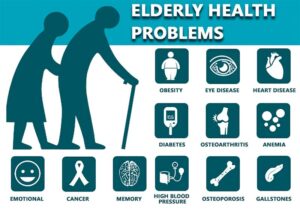
- Cancer
- Heart disease
- Dementia
- Stroke
- Arthritis
- Skin problems
- Issues with eyesight
- Kidney disease
- Lung disease
- Diabetes
- Osteoporosis
- Parkinson’s disease
- Alzheimer’s disease
The signs and symptoms as well as the effects of these conditions may contribute to feelings of depression.
In addition, many chronic health problems are accompanied by pain. According to the National Institute on Aging, more than half of older adults experience chronic pain. This can be a very difficult thing to deal with, and it can often lead to feelings of hopelessness and despair, which further consequent to depression.
Medication
Medications and supplements are a necessary part of life for many older adults. While these substances can be very helpful in managing chronic health conditions, they can also have some pretty serious side effects. According to the Mayo Clinic, some of the most common medications that can cause depression include:
- Blood pressure medications
- Heart medications
- Sleeping pills
- Painkillers
- Corticosteroids
- Parkinson’s disease medications
- Hormone therapy drugs
- Anti-seizure medications
- Chemotherapy drugs
- Certain supplements
It is important to speak with a doctor if you think that your medication is causing depression.
Loss of purpose
For many people, their work is a big part of their identity. It gives them a sense of purpose and belonging. When retired, many elderly people struggle to find a new sense of purpose. This can often lead to depression as they may feel like they no longer have anything to live for. This is a common issue for those who have retired from their careers, as well as for stay-at-home spouses who have lost their partners. Retirement can also be very stressful and lonely as they suddenly find themselves with a lot of free time and no real purpose. This can often lead to depression, as they may feel like they have nothing to live for.
Depletion in abilities
With age, our physical, mental, and cognitive abilities start to decline. This can be a very difficult thing to deal with, as it can often lead to feelings of hopelessness and despair. This is a common issue for those who are dealing with chronic health conditions, as well as for those who have retired from their careers. When our abilities start to decline, it can often feel like we are no longer useful or valuable, which can lead to depression.
Bereavement
Death is something one can never truly prepare for, no matter how much time has passed. The death of a spouse, close friend, or family member can be devastating, and it can take a long time to recover. For many elderly people, the death of a loved one is compounded by the fact that they are often dealing with their own health issues. This can make it very difficult to cope with the loss, and it can lead to depression.
Loneliness and isolation
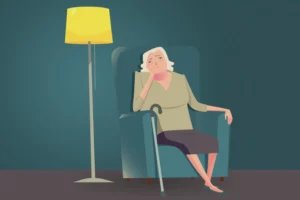 As we age, we often lose touch with our friends and family members. Whether it’s due to retirement, illness, or simply the fact that our loved ones have passed away, isolation and loneliness are very common among older adults. This can be a very difficult adjustment to make, and it’s often the cause of depression in older adults. For many elderly people, this can lead to feelings of loneliness and isolation due to a lack of social interactions. This is a common problem, as nearly one-third of adults over the age of 65 live alone.
As we age, we often lose touch with our friends and family members. Whether it’s due to retirement, illness, or simply the fact that our loved ones have passed away, isolation and loneliness are very common among older adults. This can be a very difficult adjustment to make, and it’s often the cause of depression in older adults. For many elderly people, this can lead to feelings of loneliness and isolation due to a lack of social interactions. This is a common problem, as nearly one-third of adults over the age of 65 live alone.
Elder abuse
Sadly, elder abuse is a very real problem. According to the National Council on Aging, one in ten adults over the age of 60 has experienced some form of elder abuse. This can include physical, emotional, or sexual abuse, as well as financial exploitation. This is a serious problem that can often lead to depression, anxiety, and even suicide. Most commonly, people who abuse elders are family members or caregivers. If you suspect that someone you know is being abused, it’s important to speak up and get help.
Low self-esteem
With a rapid decline in physical and mental abilities, it’s not surprising that many older adults suffer from low self-esteem. This can often lead to depression as they may feel like they are no longer valuable or useful. Additionally, the loss of independence can be very difficult to deal with, and it can further contribute to feelings of worthlessness.
Lack of support
As we age, our social circles often start to dwindle. We may retire from our jobs, our friends may move away, and our family members may pass away. This can often lead to feelings of isolation and loneliness, which can consequent in depression. Since humans are social animals, it is not surprising that a lack of social support can often lead to mental health issues
Depression in older adults is a very real problem, but it’s often overlooked. If you suspect that someone you know is struggling with depression, it’s important to reach out and offer your support.
Ways To Manage
Luckily, there are things that can be done to help manage depression in older adults. Here are a few ideas:
- Count your blessings: One way to manage depression is to focus on the positive things in your life. No matter how bad things may seem, there are always things to be grateful for. Write down five things you’re thankful for every day, and you’ll start to feel better in no time.
- Form hobbies: Doing things you enjoy can help take your mind off of your problems and give you a sense of purpose. Whether it’s reading, gardening, or hiking, find something that you love to do and make it a part of your routine.
- Encourage social interaction: Whether it’s joining a club, attending religious services, or simply spending time with friends and family, social interaction is important for mental health.
- Participate in activities: Doing things that are enjoyable and mentally stimulating can help to reduce symptoms of depression.
- Exercise: Exercise has numerous benefits for mental health, and it can be especially helpful for those dealing with depression.
- Eat right: The food we eat can have a big impact on our mood. Be sure to eat plenty of fruits, vegetables, and whole grains. In old age, it is also important to take additional supplements as per requirement.
- Get adequate sleep: Sleep is essential for good mental health, so make sure to get enough rest. An ideal sleep schedule would be seven to eight hours per night.
- Find a support group: There are often groups available to help people deal with depression, and they can be a great source of support.
- Get a pet: Animals have been shown to have a positive effect on mental health, so consider getting a furry friend.
Depression in older adults is a serious problem, but there are things that can be done to help manage it.
Professional Help
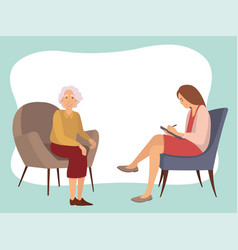 In case the depression is too severe, it is advisable to consult a professional. Sometimes, medication and therapy may be necessary to get the person out of the depressive state. Therapy is the process of talking to a trained mental health professional to help you understand and manage your feelings, thoughts, and behaviors.
In case the depression is too severe, it is advisable to consult a professional. Sometimes, medication and therapy may be necessary to get the person out of the depressive state. Therapy is the process of talking to a trained mental health professional to help you understand and manage your feelings, thoughts, and behaviors.  Medication is often used to treat depression, but it should always be done under the supervision of a doctor.
Medication is often used to treat depression, but it should always be done under the supervision of a doctor.
Some of the most common types of therapies used to treat depression include:
- Cognitive behavioral therapy (CBT): CBT is a type of therapy that focuses on changing negative thoughts and behaviors.
- Interpersonal therapy (IPT): IPT is a type of therapy that focuses on relationships and how they may be affecting your mental health.
- Behavioral therapy: Behavioral therapy focuses on changing negative behaviors.
- Psychodynamic therapy: Psychodynamic therapy focuses on understanding the unconscious mind and how it may be affecting your mental health.
Further, the medications for depression may include:
- Selective serotonin reuptake inhibitors (SSRIs): SSRIs are a type of antidepressant that increase levels of serotonin in the brain.
- Serotonin and norepinephrine reuptake inhibitors (SNRIs): SNRIs are a type of antidepressant that increases levels of both serotonin and norepinephrine in the brain.
- Tricyclic antidepressants (TCAs): TCAs are a type of antidepressant that work by inhibiting the reuptake of both norepinephrine and serotonin.
- Monoamine oxidase inhibitors (MAOIs): MAOIs are a type of antidepressant that work by inhibiting the breakdown of monoamines in the brain.
It is important to work closely with a doctor when taking medication for depression, as there can be side effects and interactions with other medications.
Depression in elderly is a serious problem, but there are things that can be done to help manage it. With proper treatment, many people are able to live happy and healthy lives.
Conclusion
In conclusion, we can understand that depression in the elderly is a serious problem, but there are things that can be done to help manage it. The causes can be both physical and psychological, so it’s important to get a professional evaluation. Treatment can be difficult, but there are many options available that can make a big difference.
If you or someone you know is looking for psychological help, Therapy Mantra is here for you. We are the leading providers of online therapy and counseling. Our team of highly trained and experienced therapists can provide assistance at the most affordable rates. Contact us today to learn more about our services. You may also visit our website to book an online therapy session or download our free Android or iOS app for more information.
